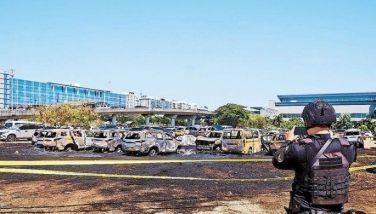DOH: UN peacekeeper has malaria, not Ebola
MANILA, Philippines - The Filipino peacekeeper from the Ebola-stricken West African state of Liberia who experienced chilling and high fever during the 21-day quarantine at Caballo Island in Cavite is suffering from malaria, the Department of Health (DOH) said yesterday.
Acting Health Secretary Janette Garin said the trooper tested positive for plasmodim falciparum in the blood, one of the strains of viruses causing malaria.
Garin said this strain of malaria is dangerous as it could affect the brain. However, because of the early detection, the patient did not have any complications.
On Friday, the DOH announced that a Filipino soldier who served as a UN peacekeeper exhibited fever, chills and body malaise, which are also symptoms of hemorrhagic fever or Ebola.
The unnamed trooper was transferred from Carballo Island to the Research Institute for Tropical Medicine (RITM) in Alabang for further tests.
“The Philippines is still Ebola free. Our patient is negative for Ebola,” Garin declared yesterday.
Garin said the other peacekeepers were happy after they were informed that their colleague tested negative for Ebola.
RITM chief Socorro Lupisan said two tests were conducted on the patient.
Lupisan said one of these was polymerace chain reaction, a test to determine if the virus had the genetic makeup of Ebola. The other, an antigen test, was to see if the patient had developed antibodies.
Garin said they were able to rule out Ebola with these two tests, despite not having completed the 48-hour period. She explained the period was only needed if there were doubts on the test results, resulting in the need for a repeat of the tests.
With these two tests, there was no need for further examinations, according to Garin.
Garin said the peacekeeper was subjected to combination drug treatment to prevent complications.
The Armed Forces of the Philippines (AFP) said that all the 133 peacekeepers coming from Liberia tested negative for Ebola after rigid screening by the United Nations.
However, they were still quarantined in Caballo Island for 21 days as a precautionary measure.
Garin said it was possible the trooper had had malaria before and he was not properly cured, or that he contracted malaria before he left Liberia.
Garin said the patient would be quarantined for a week, his blood tests to be monitored every eight hours.
Once cleared of malaria, the trooper will be sent back to Caballo to finish the quarantine period, she said.
“This is not the first time that a Filipino peacekeeper has contracted malaria,” a military officer revealed.
Years before, a Filipino peacekeeper deployed in Liberia and another in the troubled South Sudan succumbed to malaria.
Nothing to worry about
The government appealed for calm following reports that one of the 133 Filipino peacekeepers displayed symptoms similar to Ebola on Thursday.
The AFP stressed the Filipino peacekeepers, before their repatriation, were subjected to a UN-supervised Ebola-screening test back in Monrovia and were all declared under a “no-risk” category.
“They don’t have any exposure to Ebola-infected areas in Liberia,” said Lt. Col. Harold Cabunoc, AFP Public Affairs Office chief.
Cabunoc yesterday said any official announcement of medical findings on the peacekeeper confined at RITM should come from the DOH, not from the AFP.
Malacañang also called on the public to rely on the DOH for any information regarding Ebola.
Deputy presidential spokesperson Abigail Valte pointed out the 133 Filipino peacekeepers underwent rigid medical screening before they were quarantined in Caballo Island.
She also repeated the statement of the DOH that Ebola could only be infectious once the symptoms were existent.
“There are those asking why we are doing this process...the 21-day quarantine that we imposed upon their arrival here in the Philippines is just an additional measure to ensure (safety)...and for the peace of mind of their family and relatives and the people,” Valte said.
Valte noted the pronouncement of the DOH that the Filipino peacekeeper suffered from malaria and that he could have had it while in Liberia and a recurrence was possible.
“But just to be sure, he is being tested and his condition is being monitored. The DOH has assured us of final information on his condition by Monday. So let us not panic and there is no reason to panic,” Valte said.
Valte said 21 days had been decided to be the maximum quarantine period because the symptoms should come out during this period if a person was a carrier.
“To shorten it may not provide a good result...We want to be sure that we’re following all the protocols to avoid any disinformation or any panic on the part of our general public,” she said.
Based on the explanation of the experts, anyone who is a carrier, inevitably, will show the symptoms within 21 days.
Valte said the tests were continuous and the DOH should be given some time to conduct them.
Cabunoc, for his part, reiterated the military and the DOH are on top of the situation, as he appealed to the public not to panic.
Cabunoc stressed the DOH is actively monitoring the health and physical condition of every peacekeeper quarantined at Caballo Island to ensure that the country remains Ebola-free.
On the other hand, World Health Organization director-general Margaret Chan deplored the lack of research into cures and vaccines for Ebola, saying a profit-driven industry does not invest in products for markets that cannot pay, including poor African nations on the frontlines of the outbreak in West Africa.
The UN health chief attributed the lack of research into cures and vaccines for Ebola to the fact that the disease has historically been confined to poor African nations.
She added that in the midst of the Ebola outbreak ravaging parts of West Africa in the most severe acute public health emergency seen in modern times, “two WHO arguments that have fallen on deaf ears for decades are now out there with consequences that all the world can see, every day, on prime-time TV news.”
According to Chan, the first argument concerns the urgent need to strengthen long-neglected health systems.
“Without fundamental public health infrastructure in place, no country is stable. No society is secure,” Chan said.
The second argument, Chan said, is that despite the fact that Ebola emerged nearly four decades ago, “why are clinicians still empty-handed, with no vaccines and no cure?”
“Because Ebola has historically been confined to poor African nations,” she said. “The research and development incentive is virtually non-existent. A profit-driven industry does not invest in products for markets that cannot pay. WHO has been trying to make this issue visible for ages. Now people can see for themselves,” she said.
David Nabarro, UN Secretary-General Ban Ki-moon’s Special Envoy on Ebola, cited the efforts made in combating the disease and reiterated his claim that Ebola remained one of the most troubling challenges that the world could face.
Nabarro called on the international community to accelerate its response efforts. – Jaime Laude, Aurea Calica, Pia Lee-Brago
- Latest
- Trending





























